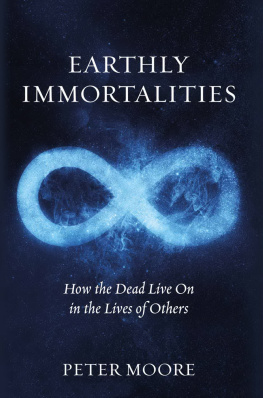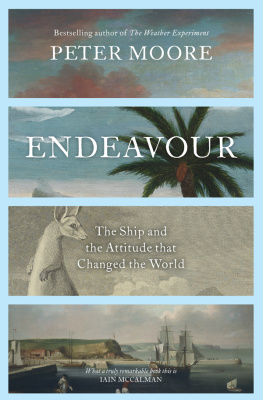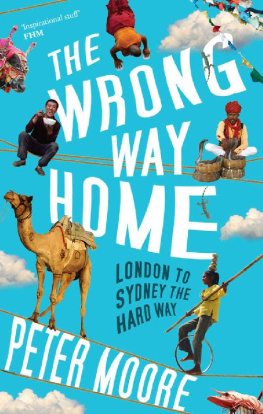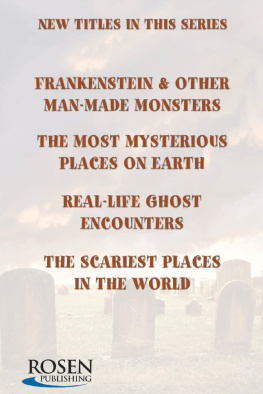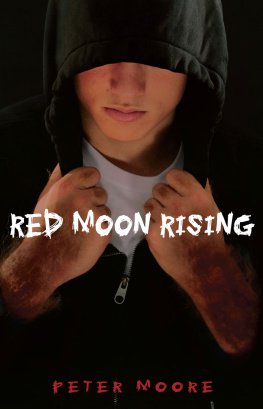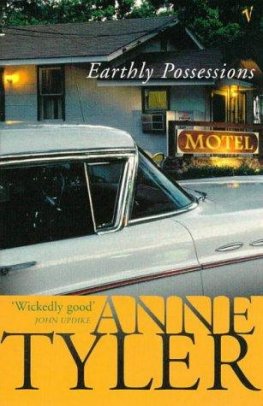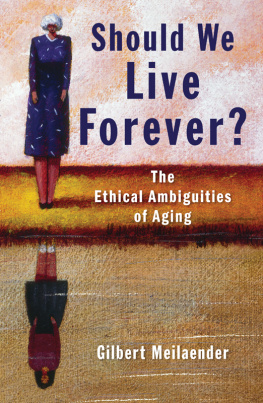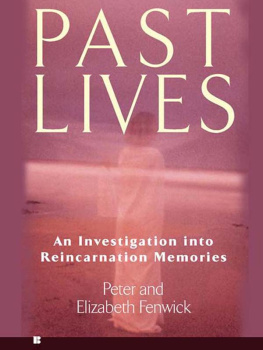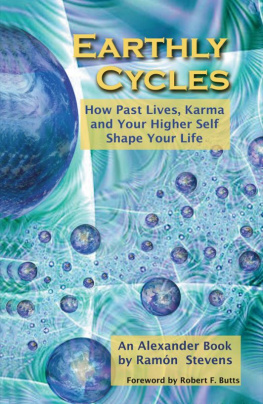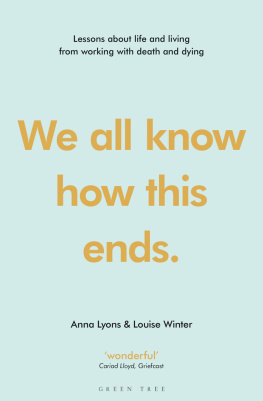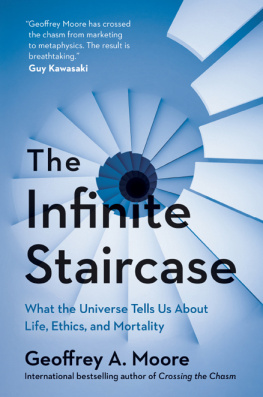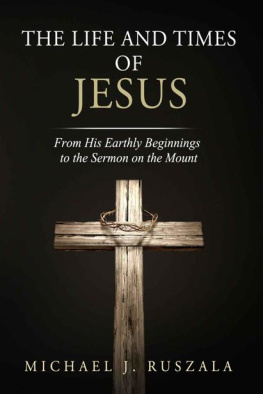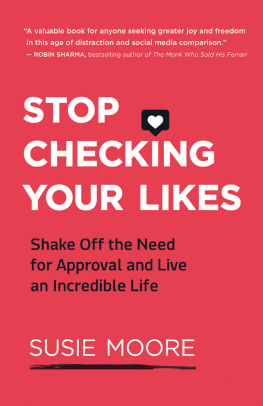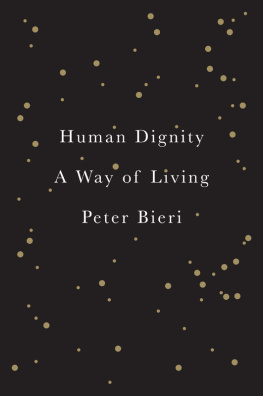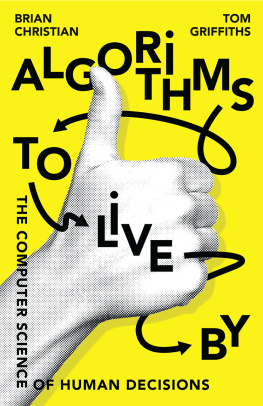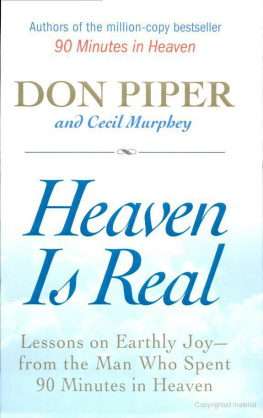
EARTHLY
IMMORTALITIES
How the Dead Live On
in the Lives of Others
PETER MOORE
REAKTION BOOKS
To George Laurence and Muriel
IN PIAM MEMORIAM
Published by
REAKTION BOOKS LTD
Unit 32, Waterside
4448 Wharf Road
London N1 7UX, UK
www.reaktionbooks.co.uk
First published 2019
Copyright Peter Moore 2019
All rights reserved
No part of this publication may be reproduced, stored in a retrieval system, or transmitted, in any form or by any means, electronic, mechanical, photocopying, recording or otherwise, without the prior permission of the publishers
Page references in the Index match the printed edition of this book.
Printed and bound in Great Britain
by T. J. International, Padstow, Cornwall
A catalogue record for this book is available from the British Library
eISBN 9781789141061
CONTENTS
PREFACE
T he idea of writing this book suggested itself while I was writing another, a book on the subject of post-mortem survival. In the course of writing this earlier book, it became clear to me that two quite distinct conceptions of immortality have been of concern to humankind two distinct conceptions which nevertheless intersect in various ways. On the one hand is the idea that we continue our existence in another world after ending our life in this one. This I call otherworldly immortality. On the other, those who have died can be seen as living on in this world, through what they have said or done or materially left behind them. It is this second kind of post-mortem survival, which I loosely define as earthly immortality, which forms the main subject of the present book.
One has only to glance through publishers catalogues and academic journals to see that intellectual interest in the broad area of death and dying is very much alive and kicking, so to speak. This interest embraces a variety of topics mediated through a whole spectrum of disciplines. How people deal with and reflect upon death and dying is an issue for religion, philosophy, psychology, psychiatry, medicine, anthropology, sociology, history and literary studies. Where the question of an afterlife arises, it is not surprising that it is ideas about some kind of otherworldly immortality that command the most attention. Somewhat thinner on the ground are studies that explicitly address the question of an earthly immortality. Among the books that have dealt with this theme in recent decades, special mention should be made of Zygmunt Baumans Mortality, Immortality and Other Life Strategies (1992), Stephen R. L. Clarks How to Live Forever: Science Fiction and Philosophy (1995), Andrew Bennetts Romantic Poets and the Culture of Posterity (1999), Robert Harrisons The Dominion of the Dead (2003), Sandra Gilberts Deaths Door (2006), Samuel Schefflers Death and the Afterlife (2013) and Thomas W. Laqueurs The Work of the Dead (2015). These fine works of scholarship, along with many of the other books and articles cited in the References or listed in the Bibliography, encouraged me to think there was room for a more general account of ideas about earthly immortality, one which would allow broader reflection on the nature and value of such immortality and on its relationship to conceptions of otherworldly immortality.
The central focus of the book is on how the ideas, activities and personalities of those who have died, in their continuing influence upon the lives of later generations, can be said to constitute an earthly afterlife for the dead. But attention is also given to some important subsidiary themes relating to mortality and posterity. One of these is the idea that people might be able to live on by not dying in the first place. This idea, originally confined to legend and fantasy, has in modern times come to be regarded by some as a real possibility within the grasp of the cybernetic and medical sciences. Nor is the idea of achieving an immortality of earthly existence absent from at least some religious traditions. The most obvious candidates here are versions of the doctrines of resurrection and reincarnation. But do either of these doctrines really promise what would-be earthly immortalists are seeking?
A second theme concerns the way in which people have learned, or at least sought, to come to terms with their mortality by eschewing any hope or even desire for immortality. Prominent here is the idea that it is not mortality that is the problem, but rather the immortality for which we not only hopelessly but mistakenly yearn. On this view, happiness and fulfilment in life come from viewing ones present earthly existence as something complete in itself. At its most positive, it is the view that human mortality is a blessing rather than a curse, and that whatever meaning our lives may have, or may acquire, is to be found within and not beyond the limits of our mortal existence. Such views are nevertheless open to challenge.
A third subsidiary theme concerns the attitudes people have to the world that will one day continue to exist without them, and also the attitudes they may have to the prospect of a future world in which all human life has become extinct. To what extent does the meaning we find in our present lives depend upon our assumption that there will always be new generations to continue the human adventure? And even if human life is likely one day to disappear from the Earth, might there yet be responsibilities which we, along with future generations, would have towards a coming world without us?
INTRODUCTION
Tis immortality decyphers man,
And opens all the mystries of his make.
Without it, half his instincts are a riddle;
Without it, all his virtues are a dream.
EDWARD YOUNG
I
W hat usually comes to mind when we think about the possibility of post-mortem survival is personal survival of bodily death in an otherworldly afterlife. A belief in this kind of afterlife continues to inform the hopes, and in some cases fears, of millions of people around the world. This is not the only possible kind of afterlife, however. The dead can also be the subjects of an earthly afterlife. They can be seen as maintaining their earthly identities, and even some kind of real presence, in the memories of the living, in the lives of their progeny, in their creative and other achievements, in their physical possessions, and even in their bodily remains. My purpose in this book is to identify the varieties of earthly afterlife; to see how such afterlives are engendered, cultivated and celebrated; and to examine how ideas about earthly afterlives relate to ideas about otherworldly afterlives.
An instructive parallel to the idea of an earthly afterlife is found in the phenomenon of the literary afterlife (and also of the iconographic afterlife and the musical afterlife). In its more general usage, the term literary afterlife describes how ideas, texts and events, as well as characters both real and fictional, are kept alive within the literary traditions of a culture. Thus one can talk about, for example, the literary afterlife of the Vietnam War, of King Arthurs Camelot or of Darwins On the Origin of Species. In the more specific sense relevant here, however, the term applies where fictional characters originating with one author reappear, in later texts or in different media, in the work of others. They will not necessarily appear under their original names or with their original identities intact. Thus fictional characters

